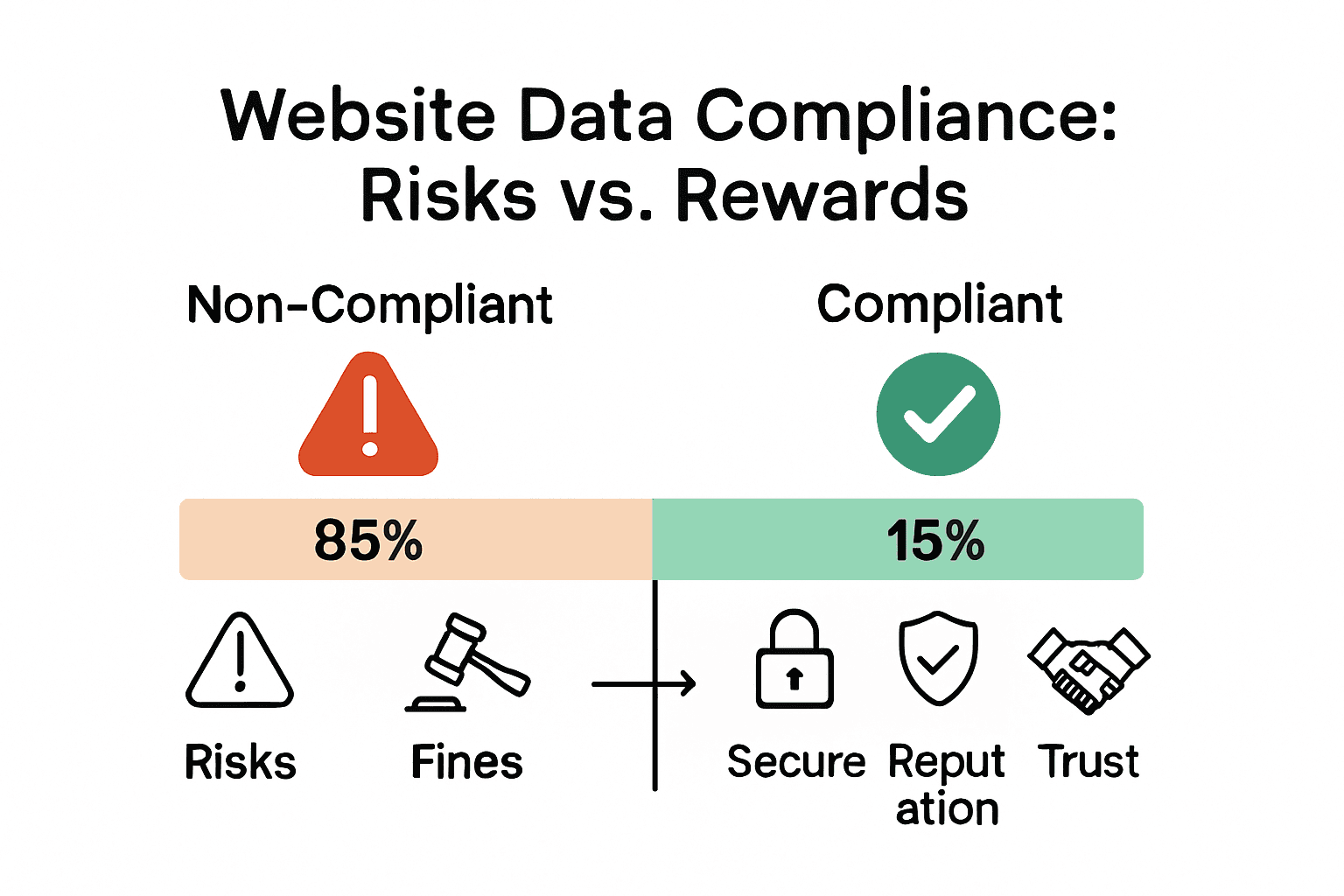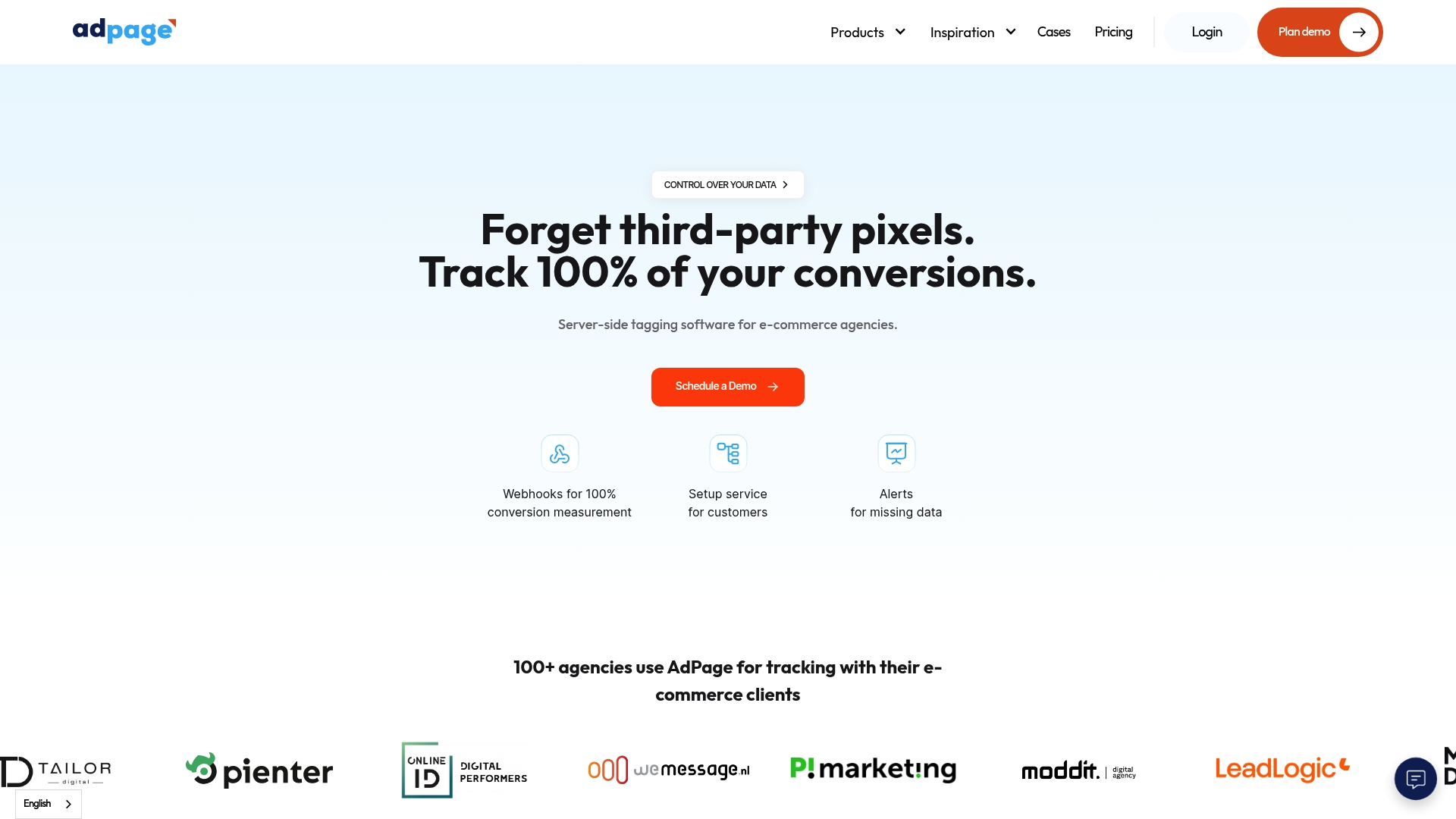Only 15% of websites meet the minimum standards for data compliance under GDPR, leaving the vast majority at risk of fines and lost trust. For marketers, this gap isn’t just about avoiding penalties. It challenges every business to rethink how they collect and use personal data, prioritize privacy, and build genuine customer confidence in a world where digital trust is more important than ever.
Puntos clave
| Point | Details |
|---|---|
| Data Compliance is Essential | Businesses must prioritize ethical data handling to protect user privacy and enhance trust. |
| Understanding Regulations | Familiarity with varying global compliance frameworks (GDPR, CCPA, etc.) is critical for marketers to avoid penalties. |
| Effective Consent Management | Implementation of robust consent mechanisms is vital to ensure legal compliance and foster user trust. |
| Embrace Server-Side Tagging | Shifting to server-side tagging can enhance data protection while improving data accuracy and site performance. |
Tabla de contenido
- Defining Data Compliance In Marketing
- Major Compliance Regulations And Standards
- Core Elements Of Consent Management
- Server-Side Tagging And Data Privacy
- Risks, Liabilities, And Enforcement Actions
Defining Data Compliance in Marketing
Data compliance in marketing represents a critical framework where businesses must collect, process, and manage user data ethically and legally while maintaining transparent practices that protect individual privacy rights. This evolving discipline goes far beyond simple checkbox exercises.
According to a recent academic study examining cookie consent interfaces, only 15% of websites achieve minimum compliance standards under GDPR regulations. This striking statistic reveals the significant challenges marketers face when implementing robust data protection strategies. Key aspects of data compliance include:
- Transparent data collection processes
- Clear user consent mechanisms
- Comprehensive data protection protocols
- Secure storage and transmission of personal information
- Actualizaciones periódicas de la política de privacidad
For marketing professionals, data compliance isn’t just a legal requirement but a trust-building mechanism. Read more about understanding user data privacy to develop comprehensive strategies that respect user rights while maintaining effective marketing operations. The goal is creating an ecosystem where data collection serves both business objectives and individual privacy expectations, transforming regulatory constraints into opportunities for building deeper, more transparent customer relationships.

Major Compliance Regulations and Standards
In the rapidly evolving digital marketing landscape, compliance regulations have become increasingly complex and stringent. Marketers must navigate a multifaceted global framework of legal requirements that protect user privacy and mandate ethical data handling practices.
The General Data Protection Regulation (GDPR) remains the most influential global standard, setting a benchmark for data protection. According to a recent enforcement action, the EU Data Protection Board issued a €200 million fine to Meta in April 2025, demonstrating the severe consequences of non-compliance. This landmark case underscores the illegality of ‘consent-or-pay’ models and highlights the regulatory body’s commitment to strict enforcement.
Key global compliance regulations include:
- GDPR (European Union)
- CCPA (California, United States)
- LGPD (Brazil)
- PIPEDA (Canada)
- SHIELD Act (New York State)
Learn more about consent management strategies that help businesses stay compliant across these diverse regulatory environments. Successful navigation requires a proactive approach: understanding local nuances, implementing robust consent mechanisms, and maintaining transparent data collection practices that respect individual privacy rights while delivering effective marketing outcomes.
Here’s a comparison of major data compliance regulations:
| Reglamento | Region | Enfoque clave |
|---|---|---|
| GDPR | European Union | User consent Data access rights High fines |
| CCPA | California, USA | Opt-out rights Do Not Sell Disclosure duties |
| LGPD | Brazil | Consent requirements Data portability Breach notification |
| PIPEDA | Canada | Fair use principles User access Safeguards |
| SHIELD Act | New York State | Data security Breach notification Expanded personal data scope |
Core Elements of Consent Management
Consent management represents a sophisticated framework for capturing, documenting, and respecting user privacy preferences across digital marketing platforms. At its core, this process ensures that businesses obtain clear, informed permission before collecting or processing personal data.
According to academic research, only 15% of cookie consent banners currently meet minimal compliance criteria, while Consent Management Platforms (CMPs) supply 67% of user interfaces. This statistic reveals significant gaps in current implementation strategies and underscores the critical need for robust consent mechanisms.
Key elements of effective consent management include:
- Granular consent options allowing users to select specific data processing preferences
- Clear, transparent language explaining data usage
- Easy opt-out and withdrawal mechanisms
- Documented user consent records
- Age verification processes
- Regular consent renewal protocols
Explore the importance of user consent in e-commerce to understand how these elements work together. Effective consent management isn’t just a legal requirement—it’s a trust-building strategy that demonstrates respect for user autonomy and creates more meaningful, permission-based marketing interactions.
Server-Side Tagging and Data Privacy
Server-side tagging represents a sophisticated approach to data tracking that fundamentally transforms how businesses collect and process user information while maintaining robust privacy standards. Unlike traditional client-side tracking, this method shifts data collection from the user’s browser to a secure server environment, significantly reducing potential privacy risks.
The primary advantage of server-side tagging lies in its ability to provide enhanced data protection and compliance. By processing tracking requests on the server, businesses can:
- Minimize exposure of sensitive user data
- Reduce reliance on browser-based tracking technologies
- Improve overall data accuracy and reliability
- Enhance website performance and loading speeds
- Maintain greater control over data transmission
Learn more about the advantages of server-side tagging and understand how this approach can revolutionize your data collection strategies. The method allows marketers to implement more sophisticated tracking mechanisms while respecting user privacy, creating a win-win scenario where businesses can gather critical insights without compromising individual data rights.
Risks, Liabilities, and Enforcement Actions
Legal compliance in digital marketing has become increasingly complex, with severe financial and reputational consequences for businesses that fail to implement robust data protection strategies. The regulatory landscape is unforgiving, demonstrating zero tolerance for negligent data handling practices.
According to a comprehensive academic study, a staggering 85% of websites fail to meet minimal compliance standards in consent mechanisms, exposing businesses to significant legal vulnerabilities. This widespread non-compliance creates a perfect storm of potential enforcement actions and substantial financial penalties.

Key risks and potential enforcement scenarios include:
- Massive financial penalties ranging from €10,000 to €20 million
- Complete suspension of data processing activities
- Public reputation damage
- Potential criminal liability for senior executives
- Divulgación pública obligatoria de las violaciones de datos
Understand more about data privacy enforcement to navigate these complex legal waters. A landmark case illustrates these risks perfectly: Meta’s ‘consent-or-pay’ model resulted in a €200 million fine in April 2025, underscoring regulators’ commitment to protecting user privacy and holding corporations accountable for their data practices.
Take Control of Your Data Compliance for 2025
Are you struggling to meet strict data compliance requirements while still capturing the conversions your marketing strategy deserves? This article highlights the growing risk for marketing teams as 85% of websites fall short of GDPR consent standards and face threats of fines and data loss. So many marketers feel anxious about unreliable tracking, non-compliant consent banners, and missing out on vital user data due to outdated methods. Your business and reputation are too valuable to leave exposed.

Discover how AdPage is built to turn complex compliance challenges into transparent success. Our platform offers robust server-side tagging and advanced consent management so you can:
- Accurately monitor 100% of conversions and eliminate hidden data loss
- Integrate seamlessly with popular e-commerce solutions
- Protect your brand with full GDPR compliance
Choose a solution that lets you stay ahead of enforcement actions and build unwavering customer trust. Visit our homepage to see how you can upgrade your data tracking and compliance—start your journey to worry-free marketing today.
Preguntas frecuentes
What is data compliance in marketing?
Data compliance in marketing involves collecting, processing, and managing user data ethically and legally, while ensuring transparency and protecting individual privacy rights.
Why is obtaining user consent important for data compliance?
Obtaining user consent is crucial as it builds trust between businesses and customers, ensuring users have control over their personal data and understand how it will be used.
What are the main compliance regulations that marketers need to be aware of?
Marketers should be aware of key regulations such as GDPR, CCPA, LGPD, PIPEDA, and the SHIELD Act, as these set the standards for data protection and privacy.
How does server-side tagging improve data privacy?
Server-side tagging enhances data privacy by shifting data collection to a secure server environment, minimizing exposure of sensitive user data and improving overall compliance and data accuracy.



.png)
